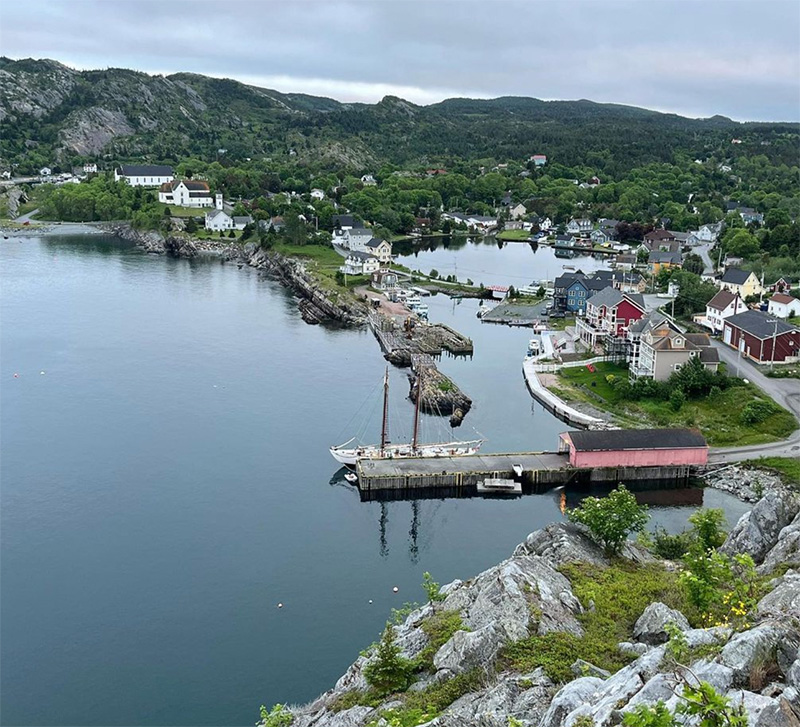7/01
Rising to deck the next morning to fetch me that first cup of coffee (the cook makes the first batch of the day “good” coffee then we survive on the instant throughout the day) I soak in the view of our surroundings; the fog again has taken a slight break and of to my left I see the interpretive Norse settlement and to my right up on the hill I see two sheep one black, one white. These sheep ran away a few days ago and have not been seen since. We learned that if you chase them, they will go further and further away taking longer to maybe return. But there they were, on holiday grazing the hillside looking at us looking at them.
Making our approach into St. Anthony we were given a spectacular treat. On approach and in thick fog we were just entering the Harbour when visibility cleared from zero to a clear summer’s day. For the first time in weeks, the vibrant scent of black spruce, and balsam fir, filled the air. A spectacular view of the lighthouse to port and the whole town of St Anthony glistening under the bright summer sky was ahead. After fueling up we moved the ship to the other side of the Harbor where we would stay for the night. Before standing the crew down, the bosun had a rig check and some other projects for the crew to complete. In addition, we held a course on Meteorology using local weather from a mesoscale to a synoptic scale as our focal point and of course the fog phenomena.
7/2
Back underway we plunged headfirst into the fog bank right where we left it the day before. A combination of motoring, motor sailing, and sailing filled the day. Deciding to skip Englee for time’s sake we did make a detour over to Groais and Bell islands to view the towering fjord-like cliffs. I had also read that this is a common nesting ground for the Puffins and we still had a crew who had not yet seen these “sea parrots”. Sure enough, a beautiful sight with icebergs and puffins commuting. Soon we were back on track and made the overnight run towards Twillingate.
7/3
Twillingate is a popular tourist destination on the Northeast Coast between Notre Dame Bay and Fogo Island. People come from all over in what seems like mostly camper vans to see the massive Icebergs up close to that ground just off the harbor. Also, Twillingate is a bustling fishing port with Crab boats coming in at all times of the day and night to sell their catch. With a tremendous flurry of activity, it is one person’s job to keep track of the numbers of each boat (being its own company) and 11 buyers at one time.
The wind came up nicely and visibility started to clear, we sailed towards Gull Island which stood just east of Twillingate Bay. having loosely planned to meet Captains Will and Finn from MMA here in Twillingate a few days prior I had just come into cell service when a message came in from Will “Is that you sailing off of Twillingate?” as I suspected they were up at the lighthouse watching Bowdoin sail in, just as planned. We gave a cannon salute and after short tacking to the head of the harbor, we struck sail and motored in to meet our friends. It was a short but sweet visit but made the trip to Twillingate special.
This little port was not far from paradise with nice hot showers, laundry, and internet there was nothing more to ask for except maybe ice cream.
6/04
Happy 4th of July! The crew celebrated with some time off and a trip to the wooden boat museum. The cook made a delicious beef and noodle dish with homemade ice cream and apple pie for dessert. Underway tomorrow.
6/05
Outbound for Brigus home and the birthplace of Bob Bartlett the famous Ice pilot that captained the Roosevelt on Admiral Peary’s 1906 and 1909 North Pole expedition. long story short our “Mac” was on that second attempt at the North Pole with Bartlett and Peary and years later during Mac’s Crocker land expedition he again sailed with Bartlett who came to save the expedition early on. Bartlett also owned the Essex-built Fredonia fishing schooner that worked as his Arctic expedition vessel and her old birth is where the Bowdoin will be docked for the night.
7/08
Leaving Brigus, it was a 46nm run to St. Johns. With light wind and patchy fog, we saw whales, dolphins, and puffins throughout the entire day. The crew practiced fixing the ship’s position terrestrially with the hand-bearing compass and radar. We continued lessons on how to use the nautical almanac to calculate sunrise, sunset, and local apparent noon. Soon the towering cut into St. Johns was upon us, and we made our way in to come alongside at Pier 6. It is always a hard adjustment to come into a bustling metropolis after weeks of remote sailing and small one-horse towns. It has its perks, but we look forward to being back at sea soon. Another port stops with an incredible amount of maritime history. The crew will visit the “rooms” the provincial museum overlooking the harbor that tells the story and history of Newfoundland and Labrador.
St. Johns will be our last stop before getting underway Sunday morning to make the 800nm passage home.











All Rights Reserved © 2026 • Web issue?
Non-Discrimination Notice • Privacy Policy & GDPR